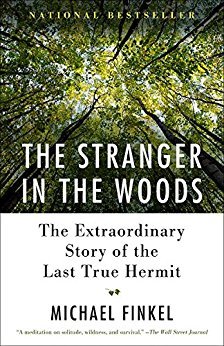More on this book
Community
Kindle Notes & Highlights
Read between
August 9 - August 12, 2024
I like being alone. My preferred exercise is solo long-distance running, and my job, as a journalist and writer, is often asocial. When life becomes overwhelming, my first thought—my fantasy—is to head for the woods.
Two of life’s greatest pleasures, by my reckoning, are camping and reading—most gloriously, both at once.
“It’s better to be tough than strong, better to be clever than intelligent,” he said, repeating a family maxim. “I was tough and clever.”
One’s desire to be alone, biologists have found, is partially genetic and to some degree measurable. If you have low levels of the pituitary peptide oxytocin—sometimes called the master chemical of sociability—and high quantities of the hormone vasopressin, which may suppress your need for affection, you tend to require fewer interpersonal relationships.
“I have become solitary,” wrote the eighteenth-century French philosopher Jean-Jacques Rousseau, “because to me the most desolate solitude seems preferable to the society of wicked men which is nourished only in betrayals and hatred.”
Around a million protester hermits are living in Japan right now. They’re called hikikomori—“pulling inward”—and the majority are males, aged late teens and up, who have rejected Japan’s competitive, conformist, pressure-cooker culture. They have retreated into their childhood bedrooms and almost never emerge, in many cases for more than a decade. They pass the day reading or surfing the web. Their parents deliver meals to their doors, and psychologists offer them counseling online. The media has called them “the lost generation” and “the missing million.”
The American essayist William Deresiewicz wrote that “no real excellence, personal or social, artistic, philosophical, scientific, or moral, can arise without solitude.”
Japanese researchers at Chiba University found that a daily fifteen-minute walk in the woods caused significant decreases in cortisol, along with a modest drop in blood pressure and heart rate. Physiologists believe our bodies relax in hushed natural surroundings because we evolved there; our senses matured in grasslands and woods, and remain calibrated to them.
A Duke regenerative biologist, Imke Kirste, working with mice, found that two hours of complete silence per day prompted cell development in the hippocampus, the brain region related to the formation of memory.
Autistic people take in too much and learn too fast, overwhelmed not only by their own emotions but by the emotions of others.
Modern life seems set up so that we can avoid loneliness at all costs, but maybe it’s worthwhile to face it occasionally. The further we push aloneness away, the less are we able to cope with it, and the more terrifying it gets.


